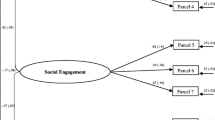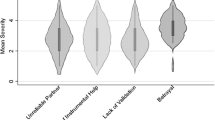Abstract
The relation between understanding of friendship and asociality was examined in 91 girls and 104 boys ranging in age from 9 to 17 years. Consistent with previous research, older children had higher understanding of friendship scores than younger children, and girls had higher understanding of friendship scores than boys. The relation between understanding of friendship and asociality was significant only for boys. Difficulty in understanding components of friendship appears to be one correlate of boys' delinquent tendencies.
Similar content being viewed by others
References
Achenbach, T. M., and Edelbrock, C. S. (1981). Behavioral problems and competencies reported by parents of normal and disturbed chldren aged four through sixteen.Monogr. Soc. Res. Child Dev. 46(1, Serial No. 188).
Asher, S. R., and Renshaw, P. D. (1981). Children without friends. In Asher, S. R., and Gottman, J. M. (eds.),The Development of Children's Friendships, Cambridge University Press, Cambridge.
Blasi, A. (1980). Bridging moral cognition and moral action: A critical review of the literature.Psychol. Bull. 88: 1–45.
Chandler, M. J. (1973). Egocentrism and antisocial behavior.Dev. Psychol. 9: 326–332.
Dodge, K. A., Schlundt, D. C., Schocken, I., and Delugach, J. D. (1983). Social competence and children's sociometric status.Merrill-Palmer Quart. 29: 309–336.
Eisenberg, N., and Lennon, R. (1983). Sex differences in empathy and related capacities.Psychol. Bull. 94: 100–131.
Eme, R. F. (1979). Sex differences in childhood psychopathology.Psychol. Bull. 86: 574–595.
Gottman, J. M. (1983). How children become friends.Monogr. Soc. Res. Child Dev. 48(3, Serial No. 201).
Gottman, J. M., Gonso, J., and Rasmussen, B. (1975). Social interaction, social competence and friendship in children.Child Dev. 46: 709–718.
Graham, S. A. (1981). Predictive and concurrent validity of the Jesness Inventory Asocial Index.J. Consult. Clin. Psychol. 49: 740–742.
Hoffman, M. L. (1977). Sex differences in empathy and related behaviors.Psychol. Bull. 84: 712–722.
Jesness, C. F. (1966).The Jesness Inventory, Consulting Psychologists Press, Palo Alto.
Jurkovic, G. (1980). The juvenile delinquent as moral philosopher.Psychol. Bull. 88: 709–727.
Kurdek, L. A., and Krile, D. (1982). A developmental analysis of the relation between peer acceptance and both interpersonal understanding and perceived social self competence.Child Dev. 53: 1485–1491.
Ladd, G. W., and Oden, S. L. (1979). The relationship between peer acceptance and children's ideas about helpfulness.Child Dev. 50: 402–408.
Lever, J. (1976). Sex differences in the games children play.Soc. Problems 23: 479–487.
Loeber, R. (1982). The stability of antisocial and delinquent behavior.Child Dev. 53: 1431–1446.
Marcus, R. F. (1980). Empathy and popularity of preschool children.Child Stud. J. 10: 133–145.
Martin, R. D. (1981). Cross validation of the Jesness Inventory with delinquents and non-delinquents.J. Consult. Clin. Psychol. 49: 10–14.
Peery, J. C. (1979). Popular, amiable, isolated, and rejected: A reconceptualization of sociometric status in preschool children.Child Dev. 50: 1231–1234.
Rubin, K. H. (1972). Relationship between egocentric communication and popularity among peers.Dev. Psychol. 7: 364.
Selman, R. L. (1980).The Growth of Interpersonal Understanding, Academic Press, New York.
Shantz, C. U. (1983). Social cognition. In Flavell, J. H., and Markman, E. M. (eds.),Handbook of Child Psychology: Vol. 3. Cognitive Development, Wiely, New York.
Urbain, E. S., and Kendall, P. C. (1980). Review of social cognitive problem solving intervention with children.Psychol. Bull. 88: 109–143.
Author information
Authors and Affiliations
Additional information
This article is based on the master's thesis of the first author, submitted to the University of Dayton.
Received M.A. from University of Dayton. Main interest is clinical psychology.
Received Ph.D. from University of Illinois at Chicago. Main interest is social cognitive development.
Rights and permissions
About this article
Cite this article
Walsh, L.M., Kurdek, L.A. Developmental trends and gender differences in the relation between understanding of friendship and asociality. J Youth Adolescence 13, 65–71 (1984). https://doi.org/10.1007/BF02088654
Received:
Issue Date:
DOI: https://doi.org/10.1007/BF02088654




